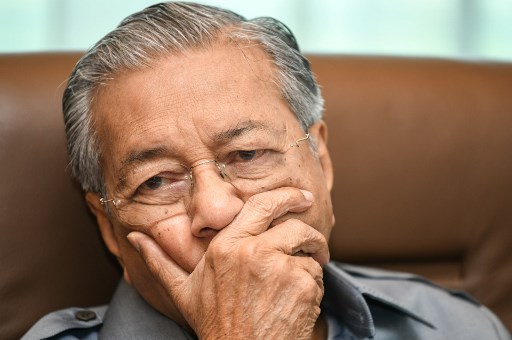In his latest blog posting on January 10, Malaysian Prime Minister Tun Dr Mahathir Mohamad spells out some of the challenges he and the Pakatan Harapan (PH) government are facing, which to a certain extent, explains some of his sometimes seemingly bizarre statements and policy initiatives.
The nonagenarian has come under some of the harshest criticisms, many even touting that Malaysia has returned a former unrepentant dictator back to power after serving as PM for 22-years in an earlier political phase.
After a series of by-election losses, some very spectacular, it seems that confidence in the PH ability to govern is fast flagging and Dr Mahathir is getting the brunt of the attacks by both the Malay and non-Malay electorates.
In one episode, the DAP was caught between the devil and the deep blue sea when twelve of its members, two of whom are elected representatives, were arrested in an anti-terrorism dragnet under the dreaded Security Offences (SOSMA), ostensibly for trying to revive the defunct Liberation Tigers of Tamil Eelam (LTTE).
The SOSMA Act was one of the laws that the PH government had promised to repeal in its manifesto in the run-up to the General Elections in 2018.
This split the party as the leadership was caught between protesting the arrests and being loyal to the Federal government partnership.
The move emasculated DAP Secretary-General Lim Guan Eng, who holds the Finance portfolio and his father, the doyen of Malaysian politics, Lim Kit Siang who is also the longest-serving Member of Parliament.
The fighting for the 12 was left to second echelon leaders like Dr P Ramasamy, the Penang Deputy Chief Minister and Charles Santiago, the Klang MP, as well other Indian party members.
Dr Mahathir’s covert support for Zakir Naik as well as his combative stance against India, our biggest buyer of palm oil, made him appear to be the bigot he made himself out to be when he was Umno president and prime minister for 22 years.
His next misstep was attending the Malay Dignity Conference, which drew dissension from both Malay and non-Malays because of his hard-hitting criticism of the Malays and referring to non-Malays as foreign elements.
Put together, along with his trademark sarcasm, Dr Mahathir represented everything that PH coalition stood against.
It is complicated but to describe Malaysia as such is putting it mildly.
The PH government inherited from BN a system of that was systemically corrupt, bigoted and with strong Islamic elements, some even bordering on the fanatical, built into the civil service.
In his latest blog posting, Dr Mahathir says that when a new government takes over from a regime running the nation for 60 years, “it would be a miracle if it were to execute all its plans and promises overnight.
“It is not taking over just any Government. It took over from a kleptocratic government, which had raped the nation for years, destroyed its finances, undermined its administrative agencies, abused its laws, borrowed well beyond the ceiling permitted, placed the country on the path to bankruptcy, made the people dependent on the Government with bribes and generally undermined the morale of the people,” he wrote in his blog Chedet.cc
In pointing out the utter state of corruption in the previous government, he said many were so used to bribery and ill-gotten favours, that they are still acting as a fifth column movement to thwart and bring down the government.
He calls this situation the ‘deep state’, which refers to a body of people, typically influential members of government, believed to be involved in the secret manipulation or control of government policy.
Because Dr Mahathir has his hands on all the levers of power, many suspect him of being the head of the “Deep State” as well.
But this would also mean that he is undermining his own administration, which makes no political, economic or social sense. Moreover, it means he is pulling the rug from under his own feet.
In his blog posting, Dr Mahathir has hinted, very subtly, that elements of the old regime are still alive, kicking and undermining the current government.
These will include fringe elements that use race and religion to thwart efforts by the PH government to put back the nation on a more even keel after the devastation wreaked on it by the Najib administration.
But Dr Mahathir is a very shrewd politician. At times, he appears to be not just appeasing these fanatical elements, but even going overboard by agreeing with them.
He knows that a vote for the PH government is a vote for moderation and to a lesser extent, a liberal policy on religious and other issues touching on race relations.
Even in the new PH government, there are fanatical elements that happened to be voted in along with the rest as they switched their political agenda to suit the current climate, like a chameleon, changes the colour of its skin to adapt to its environment.
To maintain a balance between the liberals and the fanatics, Dr Mahathir seems to be playing a very difficult act in juggling between the liberals and the fanatics, both within and outside the party,
While one cannot please everyone all the time, Dr Mahathir, at various points in his two-year tenure as PH prime minister, has managed to more than ruffle the feathers of everyone in the governing coalition.
As one observer put it, he is a firm believer in capitalism and what capital can do for both the individual, the family and the community.
He seems to be juggling his options between the liberals and fanatics and dropping the ball once too often for comfort.
While Dr Mahathir may be the oldest comeback kid in politics, he is also the shrewdest politician around and it would be a fatal mistake to underestimate him or his tenacity to weather the worst storms.
The views expressed here are those of the author/contributor and do not necessarily represent the views of The Independent Singapore. /TISG

